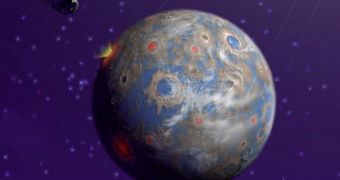A new scientific study suggests that meteorites should not be regarded exclusively as a threat to our planet. It may very well be that – in the early days of the solar system – the space rock brought the ingredients of life, or maybe even life itself, to Earth.
Researchers were able to establish that cosmic collisions may have been just as responsible for the emergence of life as the existence of the proper conditions on our world. Up until now, astronomers tended to consider huge meteorites to be agents of destruction exclusively.
The last large meteorite to impact Earth fell from the skies some 65.5 million years ago, and caused the Cretaceous- Paleogene extinction event. But, while that impact was large and devastating, experts believe that a rain of smaller space rocks may have had beneficial effects long before that.
It could be that the constant bombardment set the stage for the development of life itself, in an environment that was not necessarily prone to being inhabited before. The study was presented at a meeting of the American Geological Society this week, Space reports.
“When people think of impact events and life, probably 99 percent think of the extinction of the dinosaurs,” University of Western Ontario assistant professor of planetary geology Gordon Osinski told attendants at the meeting.
“There are always destructive effects but afterward, particularly if you're a microbe, these impacts can be beneficial,” the investigator explained further. He adds that the rain of meteorites his study refers to is known as the Early Bombardment.
The EB – which occurred about 500 million years after the planet formed – is to be differentiated from the Late Heavy Bombardment. The latter took place 4.1 to 3.8 billion years ago, and riddled the Moon, Earth, Mars and Venus with long-lasting marks.
According to Osinski, the meteorites that fell to the ground provided all the materials the planet needed to produce a deep-sea vent system. The investigators explains that the basic ingredients for hydrothermal activity is water and heat.
“The reason hydrothermal systems are thought to be so interesting is you come to the base of the tree of life, and all of those organisms are thermophiles. Basically, we don't know where life originated,” the UWO expert adds.
“It's a big open question on Earth. But hydrothermal systems have been suggested as places. You have energy, food and water – all the key ingredients of life,” Osinski concludes.

 14 DAY TRIAL //
14 DAY TRIAL //